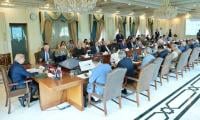The government’s economic targets in the budget 2019-20 are quite ambitious as the Gross Domestic Product (GDP) would remain dismal, the interest rate is further increasing and there are chances of further depreciation of the currency, said economists Dr Kaiser Bengali and Iffat Ara at a launching ceremony of a report ‘Analysis of Budget 2019-20: Recipe for External Debt Trap?’ on Monday.
The Pakistan Institute of Labour Education and Research (PILER) had organised the event at the Karachi Press Club. On the occasion, the economists said that allocations for social services like health, education and environmental protection are less than one percent of the total budget, whereas the development budget is being cut to meet increasing expenses on non-development sectors.
“It seems the federal government has relinquished its actual responsibility of providing basic facilities to the public,” commented Dr Bengali. There is no step in the budget that the economy would be improved, but it seems the government’s reliance on external resources has further increased in the budgetary allocations, he added.
All unnecessary imports must be banned in Pakistan, general sales tax on industries which is currently 17 percent, should be reduced to only 5 percent. Previous studies indicated that in fact the government receives only 5 percent from the tax receipts against the rate of 17 percent because of the prevailing corruption and mismanagement. Moreover, Dr Bengali suggested that all non-development expenditures must be reduced through austerity measures, and if the government reduced only 2 percent in the defence budget, it can save Rs200 billion from that one head.
Dr Bengali pointed out that whenever Pakistan goes to the International Monetary Fund (IMF) for a loan, the pre-conditions for any structural adjustment facility is to reduce the budget deficit and the current account deficit, but it is interesting to note that the government is showing in the budget an increase in the budget deficit that is difficult to understand.
The year 2018-19 closed with federal and overall fiscal deficits at 7.3 percent and 7.2 percent of the GDP. Ironically, the report pointed out that the budget 2019-20 projected the federal fiscal deficit at 8.1 percent of GDP. New ‘Fiscal Operations’ figures released by the government in August, however, raise the federal and overall fiscal deficits to -9.2 percent and -8.9 percent of GDP, respectively.
The economist, Iffat Ara, said the external financing growth was nearly doubled from 20 percent over 2016-18 to 36 percent in 2018-19 and was 26 percent above the budget in 2018-19. The Budget 2019-20 projects external revenue growth at 116 percent.
Resultantly, she pointed out that the share of internal financing has declined from 84 percent over 2016-18 to 82 percent in 2018-19 and projected to fall further to 72 percent in 2019-20. Correspondingly, the share of external financing has risen from 16 percent over 2016-18 to 18 percent in 2018-19 and projected to rise to 28 percent in 2019-20.
Dr Bengali fears a further increase in the inflation rate during the current fiscal year because, according to him, industrial growth has reduced and imports have increased. He said most of the time the government figures are incorrect. He said the unemployment rate would further increase because of the slowdown of the industrial production as most of the industries had cut down their production, thus laid-off employees and offering less working hours. This has adversely affected the income of the employees.
Not only in the manufacturing sector, the number of employees in the services sector like restaurants has also declined, he said, adding that service standards of many restaurants have declined due to a reduction in their employees.
Over 95 percent of the budget is allocated for meeting government expenses, debt service, defence and maintenance of law and order. This year there was only 2 percent increase in the social protection budget, he added.
Our economy is import-based as most of our raw material is imported. He said one can find imported food items and even special food for pet animals at the shelves of big departmental stores in urban areas, he said. “We are converted our economy into gambling economy,” he said.
The budget deficit is a big problem and last year the federal government reduced 28 percent budget of the development schemes. This year further reduction is proposed in the budget. The government plans to privatise more state units, which may further increase unemployment. The government has already privatised over 100 industries, but unfortunately most of the pritivartized industries have been closed down, he added.
Karamat Ali, executive director of PILER in his remarks, said that our agriculture production is much less than the agriculture production of our neighbouring country India. “We have never done land reforms, which has further declined our agriculture production,” he said, adding that India, just after the independence gave land to landless people for cultivation of crops, which has caused an increase in their crop output.
Sindh Chief Minister Syed Murad Ali Shah and Former Prime Minister of Pakistan Shaheed Mohtarma Benazir Bhutto . —...
Former prime minister Shaheed Mohtarma Benazir Bhutto. — APP/FileIn a country which except for its first couple of...
The image shows participants at the sit-in organised by the Majlis Wahdat-e-Muslimeen at Numaish in Karachi. —...
The representational image shows the portrait of Quaid-e-Azam Muhammad Ali Jinnah at the Quaid-e-Azam House Museum....
Vice Chancellor University of Karachi Prof. Dr. Khalid Mahmood Iraqi delivering the inaugural speech in the opening...
The chief operating officer of the Karachi Water & Sewerage Corporation , Engineer Asadullah Khan is seen at a...







